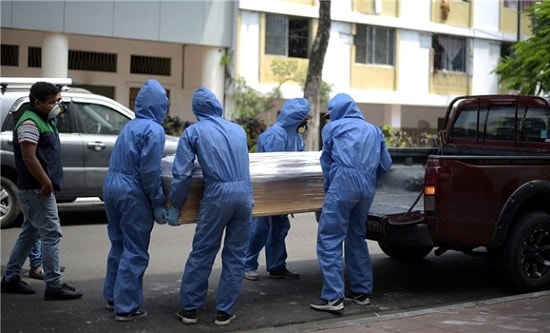
Ecuador’s deeply unpopular right-wing government has presided over a barbaric handling of the coronavirus pandemic which has resulted in Ecuador having one of the highest death rates from the virus in Latin America, with more than 630 fatalities per million by the end of September. As dead bodies were abandoned in the streets and healthcare infrastructure collapsed, the Moreno administration used the pandemic to erode labour laws and intensify attacks on workers. Millions of dollars have been paid by the government in foreign loan repayments, with yet another disastrous multi-billion dollar deal signed with the IMF, and Ecuador’s poor have been forced to foot the bill. Now, in the run up to the February 2021 election, the government is intensifying its persecution of opposition leaders and banning left-wing parties from running.
The government was woefully unprepared to deal with the coronavirus outbreak: from 2017 to 2019 under Lenin Moreno’s presidency investment in public health dropped 64%, while 3,600 healthcare workers were removed from their posts. Anti-government protests have persisted throughout the pandemic, erupting in May 2020 when Moreno introduced the so-called Humanitarian Law allowing companies to cut workers’ hours and wages. The money taken out of the workers’ pockets was apparently to be used to finance Covid relief, while the government handed $340m to the IMF in loan repayments.
Despite mass opposition, in August the Moreno administration agreed a further $6.5bn loan with the IMF, accepting the imposition of additional austerity measures and cuts to the public sector. Postgraduate doctors are currently protesting and refusing to return to work until they receive the public service contract and salary promised to them months ago. Teachers and students are protesting against the millions being cut from state universities and education facilities, while state funds to private universities remain untouched. As a result of the pandemic, government economic policies and foreign debt payments, 85% of Ecuadorians are either unemployed or in precarious jobs.
Government mismanagement during the virus outbreak has seen a number of corruption scandals. Some centre around the Los Ceibos Hospital in Guyaquil, where government policy led to a healthcare collapse in April. It is accused of paying $148.50 per body bag – normally priced at just $12 price; embezzlement of hospital drugs has been rife in the same area. The bodies of Covid-19 victims in Guyaquil have gone missing.
Recent polls by Vistazo show 89.6% of Ecuadorians have a negative view of President Moreno, who was elected to office on a progressive ticket before betraying the Ecuadorian people and siding with US imperialism against the poor and indigenous. Moreno was the first Ecuadorian president to visit the US in 17 years when he met with Donald Trump in February 2019 to discuss a trade deal supposedly similar to agreements between the US, Canada and Mexico.
It appears the current government will not win the upcoming election freely and so, in a desperate bid to cling onto power, has ramped up its persecution of political opponents. This includes the recent imprisonment of the Prefect of the Pichincha area, Paola Pabon, alongside Virgilio Hernandez and Christian Gonzalez. All three are members of the progressive Citizens’ Revolution. They are accused, with little evidence, of organising a rebellion during the popular nationwide protests against Moreno and his IMF deals in October 2019. Pabon has been illegally detained for over 70 days.
In flagrant violation of international law on human rights as well as Ecuador’s own constitution, the Electoral Council has proscribed the electoral wing of the Citizens’ Revolution party, Fuerza Compromiso Social, preventing it from running in the February 2021 election. The Party has been legally approved for four years and participated in three electoral processes, but just two days before candidates’ registration period closed was barred from running. Citizens’ Revolution members quickly found political expression through the Democratic Centre Party, which then too was rejected from participation in the elections. An appeal from Union of Hope, a coalition of left-wing parties including the two aforementioned, appealed the decision, which was rejected by the Ecuadorian National Court of Justice in record time.
This comes after former President Rafael Correa was banned from running for Vice President. Correa, who resides in Belgium, was threatened with arrest if he visited the Ecuadorian embassy in Belgium to accept his candidacy and his electronic signature was disqualified despite clear regulations that ‘documents can and must be signed electronically.’ Correa has been found guilty on spurious allegations of bribery and corruption as part of the larger attack on political opposition to the government and is unable to return to Ecuador without facing arrest. Evidence against him included the apparent existence of ‘psychic influence’. On 23 September, the Supreme Court issued an international order for his arrest.
11 former Presidents of Latin American and Caribbean countries have condemned the latest assault, demanding a restoration of democratic rights in Ecuador. These include a number who have faced violent political persecution themselves such as Evo Morales of Bolivia, Manuel Zelaya of Honduras and Luiz Inacio Lula Da Silva of Brazil. Moreno’s right-wing government has made clear that it holds itself accountable only to the needs of the Ecuadorian ruling class and to US imperialism. The mass of the Ecuadorian population, the poor and indigenous, is being left with no alternative but to fight back in defence of their sovereignty, rights and interests.
Ria Aibhilín




